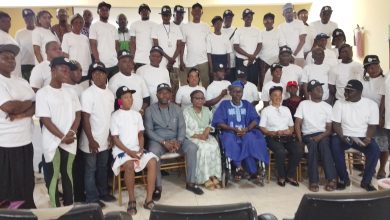Nnamdi Azikiwe University Teaching Hospital (NAUTH) on track to become Africa’s largest tertiary healthcare institution

In its strides for excellence, Nnamdi Azikiwe University Teaching Hospital (NAUTH), established in 1988, is currently undergoing a quiet yet monumental transformation in the industrious city of Nnewi, Anambra State, a region long celebrated for its enterprise and innovation in Nigeria.
Rising steadily on the city’s outskirts, the permanent site of NAUTH is a medical city in the making, set to emerge as one of Africa’s largest teaching hospitals.
Mr Augustine Okoli, Special Assistant to the Chief Medical Director (CMD), Prof. Joseph Ugboaja, on Media and Community Mobilisation made the disclosure in a statement on Tuesday.
Okoli said that with a current bed capacity of 1,500 and an ambitious long-term target of 5,000 beds, NAUTH’s permanent site is reshaping the narrative of tertiary healthcare in Nigeria and setting new benchmarks for the continent.
“From its modest beginnings as a regional medical center operating from a temporary site, NAUTH has metamorphosed into a vital institution serving Southeastern Nigeria.
“However, the hospital’s transformation truly began in 2021 with the appointment of Prof. Joseph Ugboaja as the CMD – a decisive turning point that set the current progress in motion.
“Faced with outdated infrastructure and increasing demands, Ugboaja spearheaded a bold, phased transformation plan anchored on relocation, modernisation, expansion, and future-proofing.
“It wasn’t a vague vision. Nevertheless, it was defined, measurable, and practical. His 10-year development roadmap outlined clear milestones: stabilizing existing services, activating essential units at the permanent site, and ultimately developing a multi-specialist, continent-class hospital capable of serving millions,’’ Okili said.
He noted that what sets NAUTH apart is not just its scale but the strategic thinking behind its growth. With 1,300 functional beds already in operation, the hospital is positioning itself to address both current and future healthcare challenges in Nigeria and West Africa.
“Its aspiration to reach 5,000 beds is not a mere projection – it’s a meticulously engineered expansion backed by infrastructure, investment, and purpose.
“Few institutions on the continent are undergoing such a deliberate and large-scale transformation, and fewer still are doing so with the clarity and momentum that NAUTH currently demonstrates.
“Guided by its mission to provide specialised health services in a timely, effective, efficient, and economically accessible manner, NAUTH is driven by more than numbers. It’s about the depth of service, quality of care, and the integration of medical training and research.
“The vision is audacious yet grounded: to be a globally respected center of excellence in tertiary health delivery and medical education. The hospital’s permanent site reflects modern healthcare design principles,’’ the special assistant said.
He said that built on expansive land, the site is planned as a full-fledged medical city, integrating diagnostic facilities, surgical centers, outpatient wings, teaching auditoriums, and green healing spaces.
“The environment fosters calm and recovery, while the infrastructure supports high-throughput service delivery and interdisciplinary collaboration among specialists. From the architectural layout to internal logistics, NAUTH designs every detail to reflect both efficiency and empathy.
“Services at NAUTH have expanded dramatically. The hospital now hosts advanced departments in cardiology, oncology, orthopedics, gastroenterology, pediatrics, thoracic surgery, mental health, ENT, nephrology, and more.
“The institution has introduced specialised units such as the Orthopedic Outpatient Department and Dialysis Center while integrating sophisticated imaging and surgical technologies to support complex medical interventions.
“These additions are not just upgrades – they are declarations of intent to match and eventually surpass continental standards,’’ Okoli said.
He added: “A critical part of NAUTH’s evolution is its growing workforce. From a humble team of 120 in its early years, the hospital now boasts over 2,000 professionals. These include doctors, nurses, specialists, researchers, technicians, and administrators.
“This dynamic human engine fuels the hospital’s daily operations and long-term mission. Their dedication and expertise have helped NAUTH build trust within the community and credibility in the broader medical space.
“Yet, NAUTH is more than a hospital. It is a vibrant teaching and research institution affiliated with Nnamdi Azikiwe University. Every year, it trains scores of undergraduate and postgraduate medical students while also engaging in public health research and outreach.
“The institution plays a pivotal role in shaping the next generation of Nigerian medical professionals, many of whom go on to lead in various parts of the world.’’
The special assistant said that through wellness campaigns, community health interventions, and rural medical missions, NAUTH has also maintained a direct and meaningful impact on the lives of everyday Nigerians.
He noted that the road ahead is lined with ambition but built on firm ground, stressing that as construction continues and capacity expands, NAUTH’s goal of becoming Africa’s largest teaching hospital by bed count is no longer a distant dream, it is a visible horizon.
The hospital is already drawing attention to medical tourism opportunities in West Africa, while simultaneously positioning its infrastructure to support a regional hub for both treatment and training.
“International partnerships, innovations in healthcare delivery, and a culture of continuous improvement all point to a future where NAUTH competes not just nationally but globally.
“Ultimately, the NAUTH permanent site is a symbol of what is possible in Nigeria when vision meets execution. It is a living testament to what institutional leadership, strategic planning, and community trust can build.
“As it scales toward its 5,000-bed goal, NAUTH is not just expanding, it is evolving into a continental powerhouse, a landmark in African healthcare, and a source of national pride.
“The future of medicine in Nigeria, and perhaps, a good part of Africa, is being shaped quietly but confidently in Nnewi, and the world is beginning to take notice.





